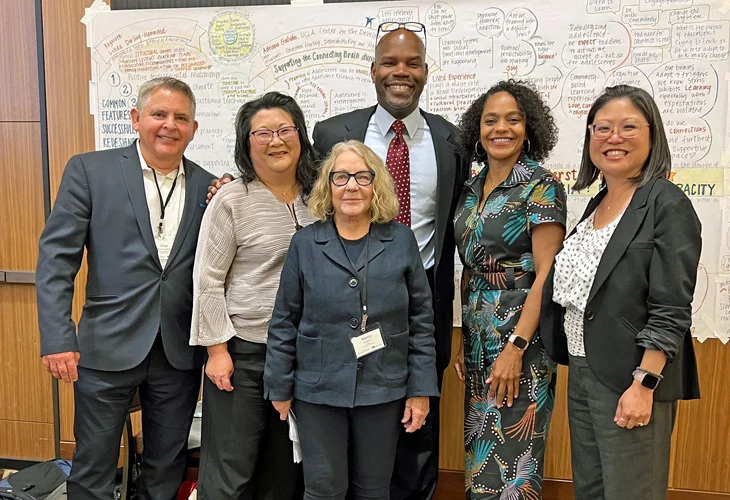By Joanie Harmon, UCLA Ed&IS News
Ed&IS researchers share expertise with 21CSLA, a statewide collaboration to support principals, districts, and educational leaders in learning from divergent voices, guiding with equity.
Nancy Parachini has seen it all. From her time as a classroom teacher and principal for LAUSD to becoming a member of UCLA’s Center X in 2006, the UCLA alumna (B.A., Psychology/Sociology; Ed.D., Teacher Education Program, Educational Leadership Program) has distilled her vast experiences across K-12 education into a new role as associate director with the 21st Century California School Leadership Academy (21CSLA), a statewide partnership between the UCLA School of Education & Information Studies, the UC Berkeley School of Education, and the California Subject Matter Project under the leadership of Rebecca Cheung, associate dean of the the Berkeley School of Education.
In 2022, Parachini transitioned from director of the UCLA Principal Leadership Institute (PLI), to executive director of leadership initiatives and international partnerships at SEIS. She contributes her expertise and UCLA’s mission of service and social justice to 21CSLA along with many Center X and SEIS colleagues, Tawny Laskar, a PLI alumna who is a Universal Transitional Kindergarten trainer for 21CSLA; UCLA Professors of Education Tyrone Howard, Anna Markowitz, John Rogers, and Daniel Solórzano, as well as Annamarie Francois, SEIS associate dean of public engagement, have recently presented webinars to enrich 21CSLA’s professional development resources.
Through 21CSLA, Parachini and her colleagues across California aim to provide high quality, equity-centered professional learning for educational leaders of schools and districts in California that receive Title II funds. These programs, which are of no cost to participants, include leading for equity and continuous improvement. There is an emphasis on leading equity issues to improve instruction and achievement outcomes – including through distance learning and rural education, supporting multilingual learners, neurodiverse students, and other historically marginalized and underserved populations. 21CSLA also provides coaching for new leaders who have completed credentialing courses and are in the field for the first time, without a mentor or a coach. The initiative also has a focus on supporting leaders who serve universal transitional kindergarten.
“We do it through multiple ways,” notes Parachini. “We have communities of practice, where we discuss how to bring leaders together who have common issues, common problems, common challenges. Sometimes the leaders participate in affinity groups. It might be [at] cross-levels, for example, teacher leaders, site leaders and district leaders, to work together on some areas of interest [such as] neurodiversity, multiple language or multilingual students, or how leaders support teachers to address the needs of their students.”
